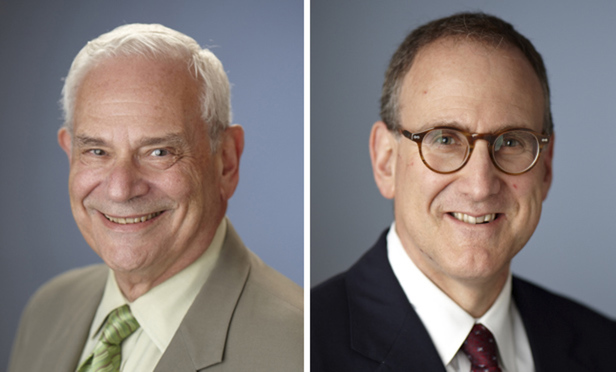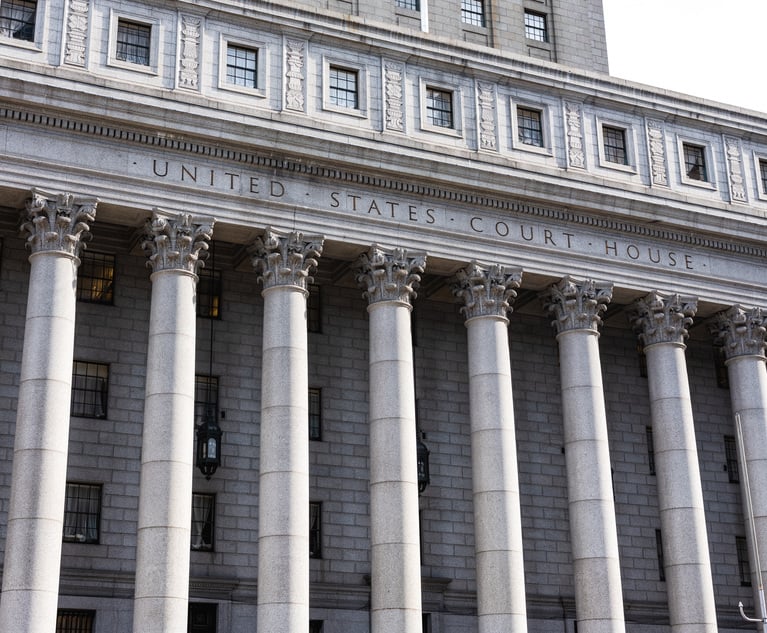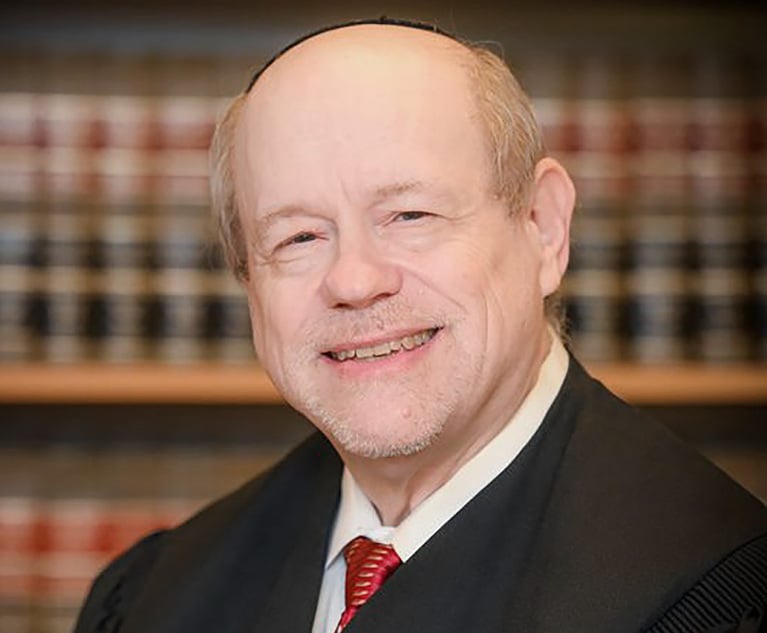Public and Private Honest Services Fraud: Are They Diverging?
In their White-Collar Crime column, Elkan Abramowitz and Jonathan S. Sack discuss cases that have begun to address whether "official act" is an element in a private honest services fraud prosecution.
July 16, 2020 at 12:30 PM
11 minute read
 Elkan Abramowitz and Jonathan Sack
Elkan Abramowitz and Jonathan Sack
In recent years, prosecutions of public corruption have often centered on whether a government official committed an "official act." The importance of that question derives from the Supreme Court's decision in McDonnell v. United States, 136 S. Ct. 2355 (2016), in which the Supreme Court held that commission of an "official act" is required to sustain a conviction for honest services fraud and Hobbs Act violations. The Second Circuit has addressed the issue in several high-profile prosecutions of state officials. See, e.g., United States v. Silver, 948 F.3d 538 (2d Cir. 2020).
The holding in McDonnell has led to the question of whether "official act" is an element of other crimes involving public and private corruption. The Second Circuit has thus far said no, holding that an "official act" need not be an element of bribery involving federal funds in violation of 18 U.S.C. §666, and foreign corrupt practices under the Foreign Corrupt Practices Act (FCPA), 15 U.S.C. §78dd-1 et seq. United States v. Ng Lap Seng, 934 F.3d 110 (2d Cir. 2019); see Elkan Abramowitz and Jonathan Sack, Limiting the Reach of the Supreme Court's 'McDonnell' Decision, N.Y.L.J. (Oct. 1, 2019).
While honest services fraud is charged most prominently in cases of alleged public corruption, the charge is often leveled in prosecutions for dishonest conduct in corporate and other private settings, such as a purchasing manager secretly accepting bribes or kickbacks for steering business. In this light, McDonnell leads to additional questions: Is "official act" an element of a private as well as public honest services fraud charge? What would an "official act" mean when an individual puts her private interests ahead of the interests of her employer?
In this article, after briefly summarizing the holding in McDonnell, we discuss cases that have begun to address whether "official act" is an element in a private honest services fraud prosecution. We focus on a recent decision by SDNY Chief Judge Colleen McMahon, United States v. Kaufman, 2020 WL 1446843 (S.D.N.Y. March 25, 2020), which held that "official act" is not an element of 18 U.S.C. §215, which prohibits bribery in connection with procuring loans from a financial institution. In reaching this conclusion, the court questioned whether the "official act" requirement applies at all to charges of private corruption.
'McDonnell' and Official Act
Former Virginia Governor Robert McDonnell was charged with arranging meetings and making introductions to state officials on behalf of a constituent in exchange for valuable gifts. Although the crimes with which McDonnell was charged—honest services fraud and Hobbs Act violations—do not refer to the commission of an "official act," which is found in the federal bribery statute, 18 U.S.C. §201, the government agreed with the defense that commission of an "official act" is an element of those crimes. The district court instructed the jury that an "official act" includes "'[a]cts that a public official customarily performs,' including acts 'in furtherance of longer-term goals' or 'in a series of steps to exercise influence or achieve an end.'" McDonnell, 136 S. Ct. at 2366 (quoting United States v. McDonnell, 792 F.3d 478, 513 (4th Cir. 2015)).
On appeal, the Supreme Court held that this instruction was too broad. Reading Section 201's "official act" definition narrowly, the court held that an official act involves a question or matter that (i) is "pending" or that "'may by law be brought' before a public official"; and (ii) involves "a formal exercise of governmental power." The court further held that, to be convicted, "the public official [must have made] a decision or [taken] an action on that question, matter, cause, suit, proceeding, or controversy, or agreed to do so." Id. at 2367-69 (citations and quotations omitted).
The court grounded its holding to a large extent in principles of federalism. The court wrote that "significant constitutional concerns" would arise if it adopted the government's more expansive interpretation of "official act." A broader definition would permit excessive involvement by federal prosecutors in state and local political affairs. See id. at 2373. Similar concerns were recently expressed by the Supreme Court in Kelly v. United States, 140 S. Ct. 1565 (2020), arising from the "Bridgegate" scandal, which held that the fraud convictions in that case rested on an overbroad theory of deprivation of public "property." The court sought to limit the ability of federal prosecutors to turn aggressive state and local political tactics into federal crimes. See id. at 1574.
Official Act in Private Honest Services Fraud Cases
Case law is sparse as to whether McDonnell applies to private honest services fraud. In United States v. Lusk, the district court considered the factual basis for a defendant's proposed guilty plea to an information which charged the defendant with honest-services fraud in connection with kickbacks he received from a company vendor. Accepting the proposed guilty plea, the court noted that proof of "official act" was not required because the elements of private honest services fraud differ from the elements of honest services fraud in the public sector. See 2017 WL 508589, at *11 n. 5 (S.D. W. Va. Feb. 7, 2017).
Similarly, in Elgawhary v. United States, 2018 WL 398284, at *4 (D. Md. Jan. 11, 2018), the district court denied defendant's motion to vacate his guilty plea, which argued that, after McDonnell, the conduct to which the defendant had pled guilty (receiving bribes from potential subcontractors) no longer constituted a crime. The court held that because the charge involved violating a duty of honest services fraud to a private employer, the "official act" element of Section 201 did not come into play.
Reflecting continued uncertainty in the law, a judge in the Eastern District of New York, in the prosecution of corruption in professional soccer, instructed the jury that "official act" is an element of a private honest services fraud. See United States v. Napout, 332 F. Supp.3d 533, 549 (E.D.N.Y. 2018), aff'd on other grounds, United States v. Napout, No. 18-2750, 2020 WL 3406620 (2d Cir. June 22, 2020). The instruction used the definition of "official act" given by the Supreme Court in McDonnell. Id. at 565. Yet, it seems, following McDonnell, the government and defense agreed to include an "official act" instruction.
'United States v. Kaufman'
In 2019, a grand jury in the Southern District of New York returned an indictment against Alan Kaufman, CEO of Melrose Credit Union ("Melrose"), and Tony Georgiton, a member and customer of Melrose, which charged violations of 18 U.S.C. §215. Section 215 prohibits giving or receiving commissions or gifts in connection with the procurement of loans from financial institutions. See 18 U.S.C. § 215(a)-(b).
The indictment alleged that Kaufman approved loans to Georgiton in exchange for substantial undisclosed gifts, including living rent-free in a house owned by Georgiton, and a gift (disguised as a loan) to Kaufman to help him buy the house. In exchange, Kaufman allegedly approved loans to Georgiton; approved favorable refinancing for over $60 million of Georgiton's pre-existing loans from Melrose; and arranged for Melrose to pay over $2 million to a company owned by Georgiton for naming rights to a ballroom in Queens. According to the indictment, Kaufman took these actions without disclosing the gifts he had been given.
In February 2020, Kaufman moved to dismiss the indictment on the ground that the allegations were insufficient in light of the Second Circuit's decision in Silver. In that case, former Assembly Speaker Silver argued that the district court's jury instructions on the requirement of a quid pro quo—which included promises to act "for the benefit of the payor … as the opportunit[ies] arose"—did not comport with the "official act" requirement as set forth in McDonnell. The Second Circuit held that McDonnell did not preclude an "as opportunities arise theory" of liability, but clarified that after McDonnell, the government must prove the public official promised to "act on an identified 'question, matter, cause, suit proceeding, or controversy' at the time the official accepted the bribe." Silver, 948 F.3d at 556 (quoting McDonnell, 136 S. Ct. at 2368) (emphasis in original)).
Kaufman relied on Silver to argue that the allegations against him—namely, that he was influenced with respect to a "variety of credit union matters," none of which he contemplated when he first began living in the home owned by Georgiton—failed to allege a quid pro quo. According to Kaufman, "[n]one of the quo allegations in the Indictment [were] alleged to have been a particular matter that Mr. Kaufman corruptly promised to Mr. Georgiton, let alone understood, in 2010." Kaufman, 2020 WL 1446843, at *4 (internal quotation marks omitted).
Chief Judge McMahon denied Kaufman's motion to dismiss the indictment, rejecting Kaufman's "foundational premise" that either McDonnell, Silver, or Section 201's "official act" requirement had any bearing on charges brought under Section 215. See Kaufman, 2020 WL 1446832, at *7. The court said the question was "whether Kaufman, the agent of a private financial institution charged under 18 U.S.C. §215, may rely upon cases interpreting a statute that criminalizes the bribery of public officials, 18 U.S.C. §201." Id. at *5. Answering that question in the negative, the court held that it saw "no reason to intermingle the independent bodies of law dealing with public and private corruption." Id. (emphasis added.)
The court looked to the plain language of Section 215, which "says nothing about 'official acts.'" Id. at *6. Rather, the government must prove only that the defendant accepted something of benefit while "intending to be influenced or rewarded in connection with any business or transaction" of the financial institution. Id. (citing 18 U.S.C. §215(a)(2)) (emphasis in original). This reading of the law was supported by the Second Circuit's decision in Ng Lap Seng, in which the court "refused to apply the McDonnell interpretation of 'official acts'—which, by definition, may only be taken by public officials—in the context of private sector bribery." Id.; see Ng Lap Seng, 934 F.3d at 133.
More generally, the government would not be required to allege that Kaufman agreed to undertake any "official act" to benefit Georgiton "because Kaufman is a private citizen whose prosecution does not raise the same constitutional concerns that justif[ied] the outcomes in McDonnell and Silver." Kaufman, 2020 WL 1446832, at *6. The prosecutions of these two prominent public officials "raised the specter of federal prosecutors violating principles of federalism, which provide states with significant leeway to 'regulate the permissible scope of interactions between state officials and their constituents.'" Id. (quoting McDonnell, 136 S. Ct. at 2373).
In the court's view, requiring proof of an "official act" is needed to prevent a problem specific to public corruption cases—over-criminalization of "any effort to buy favor or generalized goodwill from an official who either has been, is, or may at some unknown, unspecified later time, be in a position to act favorably to the giver's interest." In the case of public corruption, unlike dishonest services in the private sector, prosecutions might "interfere with the core operations of a representative democracy." Id. at *7. Criminalizing any action by a state official that benefits a particular constituent just because that constituent gave something of value to the official would undermine "[t]he basic compact underlying representative government [which] assumes that public officials will hear from their constituents and act appropriately on their concerns." Id. (quoting McDonnell, 136 S. Ct. at 2355) (quotation marks omitted). The court held that these concerns do not bear on a prosecution for corruption outside the public realm.
Conclusion
The relevance of "official act" to a private honest services fraud prosecution remains uncertain. But the law seems to be revealing a divergence between private and public corruption charges. "Official act" has been deemed essential in public corruption prosecutions to restrain overzealous federal prosecutors. The same logic has not been extended to cases of private corruption. This may be an example of courts filling in the spaces of broad, elastic white-collar criminal statutes. Future case law will no doubt clarify these issues further.
Elkan Abramowitz and Jonathan Sack are members of Morvillo Abramowitz Grand Iason & Anello. Abramowitz is a former chief of the criminal division in the U.S. Attorney's Office for the Southern District of New York. Sack is a former chief of the criminal division in the U.S. Attorney's Office for the Eastern District of New York. Dani Kirsztajn, an associate of the firm, contributed to this article.
This content has been archived. It is available through our partners, LexisNexis® and Bloomberg Law.
To view this content, please continue to their sites.
Not a Lexis Subscriber?
Subscribe Now
Not a Bloomberg Law Subscriber?
Subscribe Now
NOT FOR REPRINT
© 2025 ALM Global, LLC, All Rights Reserved. Request academic re-use from www.copyright.com. All other uses, submit a request to [email protected]. For more information visit Asset & Logo Licensing.
You Might Like
View All
Decision of the Day: Qui Tam Relators Do Not Plausibly Claim Firm Avoided Tax Obligations Through Visa Applications, Circuit Finds

'Serious Legal Errors'?: Rival League May Appeal Following Dismissal of Soccer Antitrust Case
6 minute read
Decision of the Day: Judge Sanctions Attorney for 'Frivolously' Claiming All Nine Personal Injury Categories in Motor Vehicle Case

Law Firms Mentioned
Trending Stories
- 1ACC CLO Survey Waves Warning Flags for Boards
- 2States Accuse Trump of Thwarting Court's Funding Restoration Order
- 3Microsoft Becomes Latest Tech Company to Face Claims of Stealing Marketing Commissions From Influencers
- 4Coral Gables Attorney Busted for Stalking Lawyer
- 5Trump's DOJ Delays Releasing Jan. 6 FBI Agents List Under Consent Order
Who Got The Work
J. Brugh Lower of Gibbons has entered an appearance for industrial equipment supplier Devco Corporation in a pending trademark infringement lawsuit. The suit, accusing the defendant of selling knock-off Graco products, was filed Dec. 18 in New Jersey District Court by Rivkin Radler on behalf of Graco Inc. and Graco Minnesota. The case, assigned to U.S. District Judge Zahid N. Quraishi, is 3:24-cv-11294, Graco Inc. et al v. Devco Corporation.
Who Got The Work
Rebecca Maller-Stein and Kent A. Yalowitz of Arnold & Porter Kaye Scholer have entered their appearances for Hanaco Venture Capital and its executives, Lior Prosor and David Frankel, in a pending securities lawsuit. The action, filed on Dec. 24 in New York Southern District Court by Zell, Aron & Co. on behalf of Goldeneye Advisors, accuses the defendants of negligently and fraudulently managing the plaintiff's $1 million investment. The case, assigned to U.S. District Judge Vernon S. Broderick, is 1:24-cv-09918, Goldeneye Advisors, LLC v. Hanaco Venture Capital, Ltd. et al.
Who Got The Work
Attorneys from A&O Shearman has stepped in as defense counsel for Toronto-Dominion Bank and other defendants in a pending securities class action. The suit, filed Dec. 11 in New York Southern District Court by Bleichmar Fonti & Auld, accuses the defendants of concealing the bank's 'pervasive' deficiencies in regards to its compliance with the Bank Secrecy Act and the quality of its anti-money laundering controls. The case, assigned to U.S. District Judge Arun Subramanian, is 1:24-cv-09445, Gonzalez v. The Toronto-Dominion Bank et al.
Who Got The Work
Crown Castle International, a Pennsylvania company providing shared communications infrastructure, has turned to Luke D. Wolf of Gordon Rees Scully Mansukhani to fend off a pending breach-of-contract lawsuit. The court action, filed Nov. 25 in Michigan Eastern District Court by Hooper Hathaway PC on behalf of The Town Residences LLC, accuses Crown Castle of failing to transfer approximately $30,000 in utility payments from T-Mobile in breach of a roof-top lease and assignment agreement. The case, assigned to U.S. District Judge Susan K. Declercq, is 2:24-cv-13131, The Town Residences LLC v. T-Mobile US, Inc. et al.
Who Got The Work
Wilfred P. Coronato and Daniel M. Schwartz of McCarter & English have stepped in as defense counsel to Electrolux Home Products Inc. in a pending product liability lawsuit. The court action, filed Nov. 26 in New York Eastern District Court by Poulos Lopiccolo PC and Nagel Rice LLP on behalf of David Stern, alleges that the defendant's refrigerators’ drawers and shelving repeatedly break and fall apart within months after purchase. The case, assigned to U.S. District Judge Joan M. Azrack, is 2:24-cv-08204, Stern v. Electrolux Home Products, Inc.
Featured Firms
Law Offices of Gary Martin Hays & Associates, P.C.
(470) 294-1674
Law Offices of Mark E. Salomone
(857) 444-6468
Smith & Hassler
(713) 739-1250






